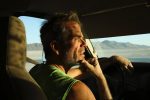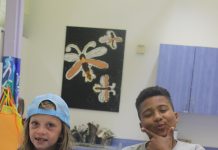A Family at Sea

“This is a judgment-free zone, where there are no mistakes. A world to explore incongruous combinations without shame or guilt. Free of criticism from snarkologists, because there are no snarkologists at Sizzler.”
-Anthony Bourdain, Parts Unknown
This summer I boarded my first cruise ship, and immediately wondered what Bourdain would think. Though he would likely disdain the concept of carbon spewing monoliths churning the seas while incessant mobs of corpulent tourists stuffed themselves at gluttonous buffets, he would likely find charity in his heart, as he did when LA artist David Choe took him to a Sizzler in Koreatown.
But I’m not Tony, and I’m no David Foster Wallace, another wildly talented suicide victim who famously wrote the snarkiest short story ever about cruising, from the anthology “A Supposedly Fun Thing I’ll Never Do Again.” This, then, would be a judgment-free cruise.
And really, who was I to judge such a robust and growing industry? Demand for cruising has increased by 62 percent in the last 10 years, with 26 million people taking a cruise in 2017, and 97 new ships on order (including ones from Richard Branson and Ritz Carlton).
So in late May, my family boarded the Sirenaship in Miami, in celebration of my father’s 90thbirthday. How lucky I was to have a pop reach this age. We were bound for Cuba (where he and my mother honeymooned), though it was questionable whether our feet would ever touch Cuban soil. The cruise line had informed us earlier that, due to the U.S.’s new hostility towards Cuba, our visa would prohibit disembarking the ship on our own, and instead we’d be confined to the glorified bus tours known in cruise-speak as shore excursions.
But I’d be damned if I was going to experience Cuba like a zoo animal behind glass. I contacted the Treasury Department’s Office of Foreign Assets Control (OFAC), and learned we were free to choose our own visa category. I played my card as a writer for this paper and declared my entourage a media mission to scout locations for a new television series. Cuba certainly wanted our money. As did the cruise ship, apparently, but after some hints of legal action, they relented.
Arrival was like Black Friday at Walmart—all 600 passengers rushing simultaneously to board and get lunch before it ended.
The first thing I noticed was all the safety precautions. After all, cruise ships are floating petri dishes, synonymous with outbreaks, terrorist attacks, suicides, and captains trying to impress their mistresses and running aground. After our mandatory safety briefing, we were slightly alarmed to find gallon-sized hand sanitizers everywhere. Yet when I saw how many elderly folks clung to the railings when walking the staircases, I was both grateful to have sanitizers on every floor, and vigilant about never touching those railings. We washed our hands so often I wondered if the only thing we were catching was Obsessive-Compulsive Disorder.
Then there was the food. Ginormous buffets. Something for everyone. But nothing we could touch. Not even a roll. It all had to be served by staff, no doubt another precedent caused by some outbreak of food borne illness.
Our first stop was Great Stirrup Cay, an island in the Bahamas that had been settled, not by pirates or pilgrims, but by Norwegian Cruise line. They owned the whole thing, and it consisted of a horseshoe shaped cove, and a cavernous food pavilion with, yes, a buffet. With food imported straight from the ship.
As for Cuba, well, you can’t really sink in to a country when you are allowed six hours at a port. Just enough time to grab a mojito, listen to some music, and stare at your watch to make sure you don’t get left behind. But I’d been to Cuba already, though it’s always a refresher course on how to live when you witness a culture so short on resources but long on resourcefulness. A culture that lives for art, poetry and music instead of stuff.
Nope, this trip was about celebrating three generations of a small family that would likely never have this chance again. And that centered on the ship, where my father wisely stayed.
We took advantage of all they offered—gym, spa treatments, games, shows, lectures, and even bingo. Though my mother is pretty sure it’s fixed! The international staff of happy, smiling people performed their tasks as if they had the greatest jobs in the world. They, like the Cubans, were my teachers. But my daily activity was to make sure my dad made his way around the ship’s considerable girth without falling, made more difficult after his second or third scotch, and a sometimes roiling sea. He was frightened by the challenges and unfamiliar surroundings, but he tried not to let on. I organized his things and helped him in and out of his clothes. I even bathed him. He allowed himself to be vulnerable and cared for, and that was the greatest gift of all. I owe him so much and, if nothing else, the cruise ship made those precious moments possible.
Billy Fried hosts “Laguna Talks” on Thursday nights at 8 p.m. on KX93.5 and can be reached at [email protected].




